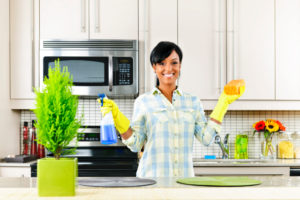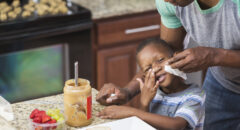
Do you worry about allergies when spring cleaning comes around?
Spring cleaning can be more than just cleaning—for some, it is a purging ritual. It’s a time to get rid of the old and wash away any dirt in preparation for the beautiful months that are soon to come.
For people with allergies, however, spring cleaning may not be such a happy ritual.
Many cleaning products on the market today have been known to irritate allergies.
Symptoms of irritation that can be caused by spring cleaning products include:
- Sneezing
- Itchy, watery eyes
- Congestion
- An asthma attack or wheezing
- Skin rashes
The best way to avoid irritation from cleaning products is to have someone in the household who does not have allergies do the cleaning.
Even the act of cleaning, especially sweeping and dusting, can trigger an allergic reaction. Dust and other allergens can be stirred up.
However, if you suffer from allergies and must do your own cleaning in your home, there are options.
Most importantly, it can help to use products that are less likely to cause allergy symptoms.
Spring Cleaning Products to Avoid to Minimize Allergies
It’s best to stay away from cleaning products that contain harsh, potentially irritating chemicals. Read product labels to avoid the following ingredients:
-Formaldehyde
-Bleach
-Ammonia
-Sodium lauryl sulphate
-D-limonene
-Sodium hypochlorite
These chemicals are found in many cleaning products, including:
-Furniture polish
-Disinfectants
-Mildew removers
-Dish detergents
-Dish soaps
-Laundry detergents
-Fabric softeners
-All-purpose cleaners
-Drain, oven, and glass cleaners
Spring Cleaning Products to Use to Reduce Allergies
For allergy sufferers, the best types of cleaning products are those that are labeled nontoxic.
And the good news is that today is there is a great deal of awareness.
Many harsh chemicals that have been around for decades are truly harmful to humans as well as the environment.
“Green” cleaning products are usually a better option for those with allergies. Read the labels carefully. These products may contain irritating substances.
Baking soda and vinegar can get just about anything clean, in different concentrations for different uses. Here are some suggestions:
-Vinegar* and salt for a surface cleaner
- Baking soda and water to clean baby bottles
-Baking soda on carpeting to remove scents or odors
-Olive oil or lemon juice with vegetable oil for furniture care
-Ventilation, cinnamon and cloves, or steeped tea for air freshening
*Never mix bleach with vinegar or bleach with ammonia.
Regular Spring Cleaning Reduces Allergies
Allergy sufferers can benefit from regular home cleaning to reduce indoor allergens. It includes molds, pollen, pet dander, dust mites, and insect droppings.
Consider adding these cleaning tasks to your regular routine:
-Reduce dust-collecting clutter
-Regularly vacuum carpeted floors with a double-bag or HEPA filter vacuum
-Regularly wash blankets and throw rugs
-Wash all bed linens in hot water every week
-Keep counter surfaces clean and dry
-Do not leave food exposed on kitchen counters and store food in sealed containers
Taking a few simple steps to keep dust to a minimum is key. Aim to prevent molds from growing. Control cockroaches and other pests to help minimize anyone’s allergy symptoms.








